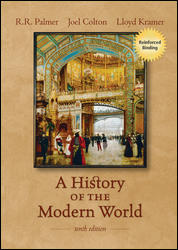
History of the Modern World, 10th Edition (Palmer)Chapter 9: The French RevolutionChapter OverviewIn 1789, a revolution in France transformed the old regime into a modern society. The turbulence of the revolutionary years, the conflicting ideologies of the participants, the role of violence, and the participation of the various social classes continue to spark debates around the world. Enlightenment values and ideals shaped the culture of critical and public debate that led to the challenge of traditional authority. Tensions between the king, the nobility, and the Third Estate over matters of taxation and governance led to the establishment of the National Assembly and the issuance of the Declaration of Rights of Man and Citizen. The National Assembly and revolutionary governments that succeeded it struggled over matters of equality, economic policies, the difficulties of warring with the rest of Europe, and their relationship with the church. Anti-revolutionary forces within France and in the rest of Europe threatened the success of the revolution. The National Convention resorted to terror to repress anti-revolutionary sentiments; this government also pursued the dechristianization of France. The bourgeois reaction to radicalism paved the way for Napoleon Bonaparte’s rise to power when the Directory was forced to seek his assistance. Bonaparte, in one of the last efforts at enlightened despotism, restored peace at home, spread revolutionary reforms around Europe, and ruled through a mix of revolutionary and reactionary policies. The worst aspects of the old regime had been destroyed, but the most radical hopes of the revolution were never realized. |  |















